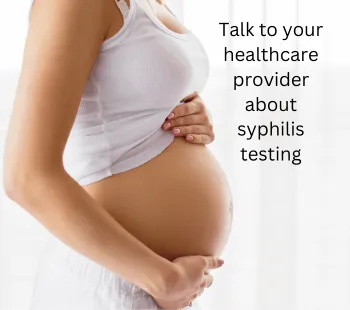May 15, 2024

Syphilis is a sexually transmitted infection (STI) that doesn’t always show signs or symptoms. Those who are pregnant can pass the infection in utero to their baby without knowing it. If untreated, syphilis can cause major complications for adults and can be deadly for babies. But, with testing and immediate treatment, we can cure it – at little or no cost to you.
In Colorado, the number of overall cases of syphilis tripled from 2018 to 2023. Congenital syphilis, which is caused when a mother with syphilis passes the infection to her baby during pregnancy, has increased by 7 times from 2018 to 2023 with a total of 50 cases in Colorado in 2023. So far in 2024, there have been 25 reported congenital syphilis cases, including five stillbirths and two neonatal deaths. The substantial increase in syphilis cases has led the state health department to declare a congenital syphilis epidemic effective April 25, 2024, and has recommended increased syphilis testing in response to the sharp rise in cases. It requires all health care facilities in the state to offer syphilis testing at least three times during pregnancy (in the first and third trimesters and then at admission for delivery).
Who should get tested?
- Any person who is sexually active between ages 15-44 should be offered testing.
- All pregnant people at first prenatal visit, in the third trimester, and at delivery.
- Anyone being tested for a sexually transmitted infection.
Why get tested?
- Syphilis can cause long term health problems if the infection is untreated.
- You may have no outward signs or symptoms of syphilis.
- Syphilis in pregnant people can cause miscarriage, stillbirth, or the baby’s death shortly after birth.
Where to get tested?
- Your health care provider.
- Community or commercial testing sites for sexually transmitted infections.
- The Denver Sexual Health Clinic at the Public Health Institute at Denver Health.
Syphilis is detected using a simple blood test and is easily curable. You can schedule an appointment with your primary care provider or call the Denver Sexual Health Clinic at 303-602-3540 to set up an appointment. Convenient syphilis testing sites are also located throughout the Denver metro area.
Learn more about syphilis symptoms, testing and treatment.
For Providers
Colorado is taking immediate action to respond to increases in syphilis and congenital syphilis.
All healthcare facilities, like hospitals, urgent care clinics, community health clinics, emergency departments, and other medical offices, must provide additional services to stop the spread of syphilis in the state, particularly among those who are pregnant.
Public Health Order 24-01 requires all healthcare settings and medical providers who care for anyone who is pregnant to offer syphilis testing:
- In the first trimester of pregnancy (between 1-12 weeks), or at the patient’s first prenatal visit.
- In the third trimester.
- At the time of delivery.
- When there is a fetal death after 20 weeks' gestation.
- If the patient goes to an urgent care center or emergency room, and has not received prior prenatal care or had have adequate syphilis screening during their current pregnancy
- At correctional facilities, including prisons, jails, and juvenile detention centers, at the intervals and events described above.
These requirements are in addition to the expanded screening recommendations issued in the Health Alert Network broadcast on April 1, 2024.
Additional Resources
- CDPHE: syphilis information
- CDPHE: syphilis in Colorado - trends and real-time data
- STD information and conversation starters from Beforeplay.org
- Centers for Disease Control and Prevention (CDC): syphilis information
- Denver STD/HIV Prevention Training Center
- Planned Parenthood of the Rocky Mountains

